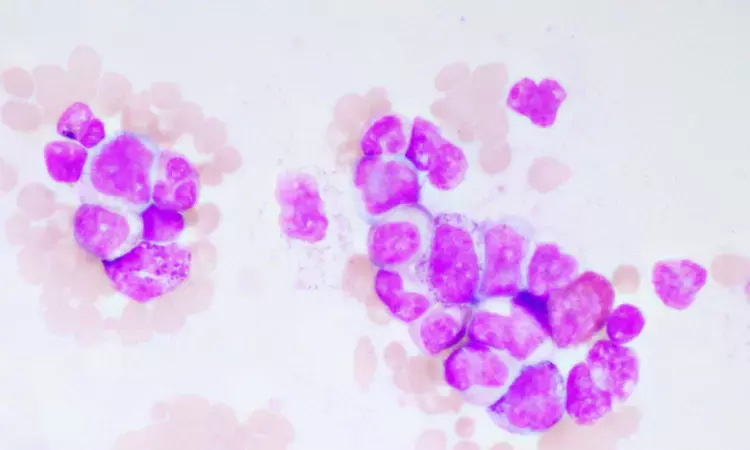- Home
- Medical news & Guidelines
- Anesthesiology
- Cardiology and CTVS
- Critical Care
- Dentistry
- Dermatology
- Diabetes and Endocrinology
- ENT
- Gastroenterology
- Medicine
- Nephrology
- Neurology
- Obstretics-Gynaecology
- Oncology
- Ophthalmology
- Orthopaedics
- Pediatrics-Neonatology
- Psychiatry
- Pulmonology
- Radiology
- Surgery
- Urology
- Laboratory Medicine
- Diet
- Nursing
- Paramedical
- Physiotherapy
- Health news
- Fact Check
- Bone Health Fact Check
- Brain Health Fact Check
- Cancer Related Fact Check
- Child Care Fact Check
- Dental and oral health fact check
- Diabetes and metabolic health fact check
- Diet and Nutrition Fact Check
- Eye and ENT Care Fact Check
- Fitness fact check
- Gut health fact check
- Heart health fact check
- Kidney health fact check
- Medical education fact check
- Men's health fact check
- Respiratory fact check
- Skin and hair care fact check
- Vaccine and Immunization fact check
- Women's health fact check
- AYUSH
- State News
- Andaman and Nicobar Islands
- Andhra Pradesh
- Arunachal Pradesh
- Assam
- Bihar
- Chandigarh
- Chattisgarh
- Dadra and Nagar Haveli
- Daman and Diu
- Delhi
- Goa
- Gujarat
- Haryana
- Himachal Pradesh
- Jammu & Kashmir
- Jharkhand
- Karnataka
- Kerala
- Ladakh
- Lakshadweep
- Madhya Pradesh
- Maharashtra
- Manipur
- Meghalaya
- Mizoram
- Nagaland
- Odisha
- Puducherry
- Punjab
- Rajasthan
- Sikkim
- Tamil Nadu
- Telangana
- Tripura
- Uttar Pradesh
- Uttrakhand
- West Bengal
- Medical Education
- Industry
Nilotinib Linked to increased diabetes and hyperlipidemia risk in Chronic Myeloid Leukemia Patients

A recent study published in The oncologist Journal found Nilotinib (tyrosine kinase inhibitor) therapy for chronic myeloid leukemia (CML) associated with increase in risks of diabetes and hyperlipidemia.
Metabolic syndrome, characterized by a cluster of conditions including diabetes, hyperlipidemia, and hypertension, has been found to be a risk factor for CVDs. The study by Cih-En Huang and team aimed to dissect the role of TKIs, including imatinib, nilotinib, and dasatinib, in contributing to the development of these conditions.
Incorporating data from 1211 CML patients without diabetes, 1235 without hyperlipidemia, and 1074 without hypertension, the study revealed intriguing patterns. Among the TKIs, nilotinib stood out, showing the highest incidence rate of post-TKI diabetes and hyperlipidemia when compared to imatinib and dasatinib. The calculated incidence rate ratios (IRRs) underlined the significance of these findings.
Even after adjusting for potential confounding factors, nilotinib retained its status as a notable risk factor for both post-TKI diabetes and hyperlipidemia. The subdistribution hazard ratios (SHRs) for these conditions were substantial, further affirming the increased risk associated with nilotinib treatment.
Moreover, the study delved into the connection between TKIs and CVDs. In particular, patients treated with nilotinib were found to face a higher likelihood of developing CVDs, particularly in comparison to those on imatinib within the non-hyperlipidemic group. This observation highlighted the potential cardiovascular risks posed by certain TKIs.
The study underscored the crucial role of hyperlipidemia in the development of CVDs. Both pre-existing and post-TKI hyperlipidemia were linked to significantly elevated SHR values for CVDs, emphasizing the need for proactive management of lipid levels during TKI therapy.
As a result of these findings, the researchers recommended a comprehensive approach to patient care. CML patients undergoing nilotinib treatment should undergo thorough screening for diabetes and hyperlipidemia before initiating TKI therapy. Furthermore, continuous monitoring of lipid profiles during TKI treatment is crucial for early detection and intervention.
Reference:
Huang, C.-E., Lee, K.-D., Chang, J.-J., Tzeng, H.-E., Huang, S.-H., Yu, L. H.-L., & Chen, M.-C. (2023). Association of Nilotinib With Cardiovascular Diseases in Patients With Chronic Myelogenous Leukemia: A National PopulationBased Cohort Study. In The Oncologist. Oxford University Press (OUP). https://doi.org/10.1093/oncolo/oyad225
Neuroscience Masters graduate
Jacinthlyn Sylvia, a Neuroscience Master's graduate from Chennai has worked extensively in deciphering the neurobiology of cognition and motor control in aging. She also has spread-out exposure to Neurosurgery from her Bachelor’s. She is currently involved in active Neuro-Oncology research. She is an upcoming neuroscientist with a fiery passion for writing. Her news cover at Medical Dialogues feature recent discoveries and updates from the healthcare and biomedical research fields. She can be reached at editorial@medicaldialogues.in
Dr Kamal Kant Kohli-MBBS, DTCD- a chest specialist with more than 30 years of practice and a flair for writing clinical articles, Dr Kamal Kant Kohli joined Medical Dialogues as a Chief Editor of Medical News. Besides writing articles, as an editor, he proofreads and verifies all the medical content published on Medical Dialogues including those coming from journals, studies,medical conferences,guidelines etc. Email: drkohli@medicaldialogues.in. Contact no. 011-43720751


